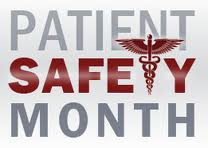As summer rolls into high gear, lots of people have activities and getaways on their minds, but safety should also play a part in summer fun. The National Safety Council has designated June as National Safety Month and the US Department of Health and Human Services has assembled a great toolkit for public use. Nurses have such direct roles with patients, and there’s a lot you can do this month to encourage patient safety.
Whether you’re an OR nurse or a school nurse, in a hospital setting or in a home care setting, here are a few talking points you can bring up in patient discussions.
Stress Fall Prevention
Patients return home stronger, but still might be a little shaky or unsteady on their feet. New medications, lack of sleep in the hospital, or even apprehension about returning to a home environment can make people more likely to stumble. Add a less-than-ideal home environment, and people can be at real risk for serious falls and injury when they get home. Talk with patients about safety bars in bathrooms, proper use of assistive equipment like walkers or canes, and eliminating hazards in the home like loose rugs.
Talk About Medication
When people take multiple medications, the potential for mix ups rises. Talk to patients about implementing medication reminders so they take pills on time and medication storage so they are taking the right pills at the right times. There are lots of new devices (some that pop open at the designated time) and apps (if patients use those) to help people remember to take medications when they should. In addition, remind them to keep the medications in a cool, dry place – not a bathroom cabinet! And remind people to check for expired medications and the importance of locking up medications if young kids are in the home.
Discuss Water Safety
With warmer weather comes the increased risk of water accidents. When you see young families, make sure to remind them of watching all kids diligently around water of any kind. Whether it’s a well-supervised pool party or a causal picnic at the lake or beach, kids can drown quickly and with very little motion or noise to show they are in trouble. Stress the life-or-death importance of having a responsible adult watch the kids near water all the time. Adults should be aware when they are on duty and when someone else has taken over.
Driving Safety
Have you noticed an aging relative or friend is driving more erratically? No one looks forward to the conversation about having to give up driving for good, but real trouble can happen if concerned relatives and friends wait too long. You can explain to patients and their families that just as young drivers need to be monitored when they are just starting out driving, older drivers and those with potentially impairing medical conditions also need to be monitored. If a family member expresses concern, ask them to take a ride with Mom or Dad to see how they are behind the wheel. But encourage them to be gentle with any bad news. Handing over the keys is a real loss for many people and many struggle with giving up this independence. But if loved ones are sure the driving is a safety hazard, they have no choice but to act.
There are lots of ways nurses can work patient safety issues into conversations during National Safety Month. What other safety concerns do your patients have?
- WOC Nurses Week Highlights Specialty - April 16, 2024
- Honoring Radiology Nurses Day on April 12 - April 12, 2024
- Travel Offers New Career Possibilities - April 8, 2024



